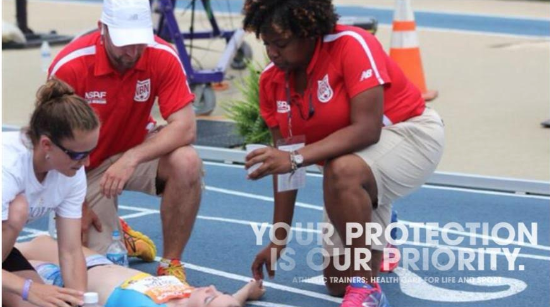By Water or by Land: Matthew Devens

Along with his colleagues, Matthew Devens, pictured in the center, helps a girl that collapsed at the High School Track and Field Nationals, which took place at Greensboro North Carolina in 2013.
April 3, 2017
NYU athletic trainer Matthew Devens, a Bellmore, N.Y. native, grew up exploring the bay on his family’s 17-foot Boston Whaler. One of five siblings, Devens spent summers fishing, clamming and water-skiing. He learned to love spending time in and around the water from a young age.
His love for sports continued into his time at John F. Kennedy High School, where he competed for the track, cross-country and swimming teams. He credits his track and cross-country coach Al Berkowsky for instilling discipline in him and inspiring him to succeed. Berkowsky, along with JFK’s record as as a state champion in multiple track events, pushed Devens to train hard. He ended up at the Division II school Southern Connecticut State University, where he ran track for one year.
It was at Southern Connecticut State that Devens realized he wanted to prioritize his passion for athletic training, but that didn’t mean he was going to hang up his swim trunks or his running sneakers just yet.
“I still competed in swimming, track and field and running on my own, in pursuit of meeting my own personal goals while mainly focusing on and working toward my career goals,” Devens said.
A certified lifeguard since the age of 16, Devens began at a local pool and advanced to lifeguarding at busy Jones Beach as a college student. He’s spent the past 13 summers keeping watch over people diving into the crashing waves of the Atlantic Ocean.
“It helps you stay fit, and it is very competitive,” Devens said. “Lifeguards have to try out every year and pass a test before they can be a lifeguard at Jones Beach. Being a lifeguard has taught me how to react and handle stressful situations when it’s you, a huge body of water, large waves and one or multiple victims.”
Devens said that lifeguarding has helped him as an athletic trainer because it taught him to be aware of his surroundings, whether it be by the water or athletic field. He said reacting and responding quickly and with control are essential for success in both professions.
Devens returned to New York after graduation. He volunteered as an athletic trainer at his alma mater and other local high school cross-country races in his community for a month following college. He finally convinced the organization facilitating the events that it was necessary to have a paid professional athletic trainer on site. As a graduate student at Long Island University Brooklyn, Devens worked these events exclusively.
After grad school, he landed a job at Hunter College, working as a part-time athletic trainer and in the equipment room. However, it was as a trainer for the Brooklyn Aviators hockey team that Devens’ athletic training career took off.
“I traveled for a year all over the Northeast and into Canada,” Devens said. “I was the primary health care provider for the team, taking care of traumatic on-ice injuries ranging from severe concussions to lost teeth. Having that experience showed me that I could be successful as an athletic trainer in competitive sports.”
Devens joined the NYU community in 2011, serving as the Head Athletic Trainer for the then NYU-Poly before NYU athletics and NYU-Poly athletics officially merged in the fall of 2014.
Devens works with the women’s softball, men’s soccer, and both the men and women’s track and cross-country teams at NYU. Devens said he particularly enjoys traveling with and working alongside the track and cross-country teams due to his own passion and the years of training he has dedicated to the sport.
“My favorite part of working with college athletes is seeing their tenacity and ability to rebound and maintain a positive spirit when dealing with setback after setback,” Devens said.
In addition to his position at NYU, Devens also works as part of the medical team for the National Scholastic Athletic Foundation, the national governing body for high school cross-country and track and field in the United States.
Devens’ college mentor made a lasting impression on him while he was still studying at Southern Connecticut State. Charlie Davis, professor of Emergency Care and First-Aid CPR, told him to “be your own superhero.” Once Devens was put on the spot and forced to act under pressure as an athletic trainer, he understood Davis’ message.
“You’re the person everyone looks to on the field when a situation arises,” Devens said. “At first you think [Davis] is just saying it, but when it actually happens, you’re like, whoa I’m the guy.”
A version of this article appeared in the Monday, April 3 print edition. Email Trevor Francesconi at [email protected].


























































































































































